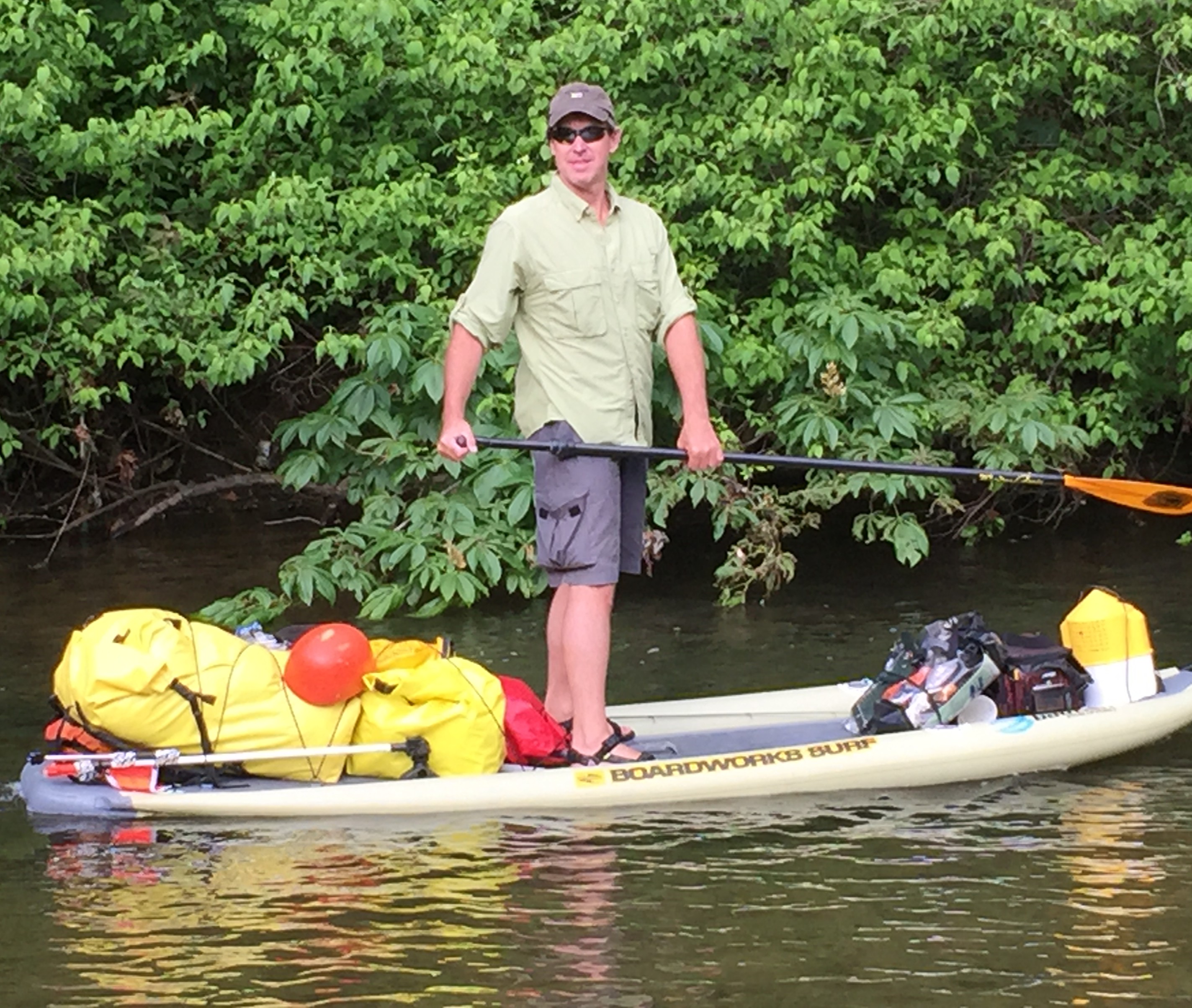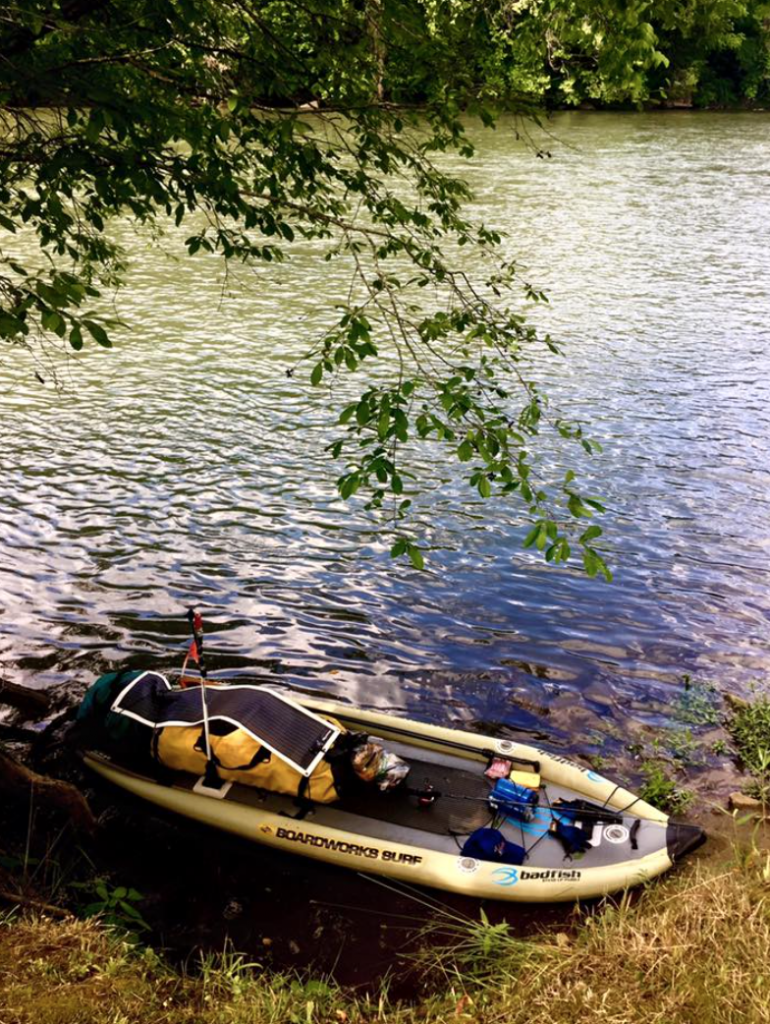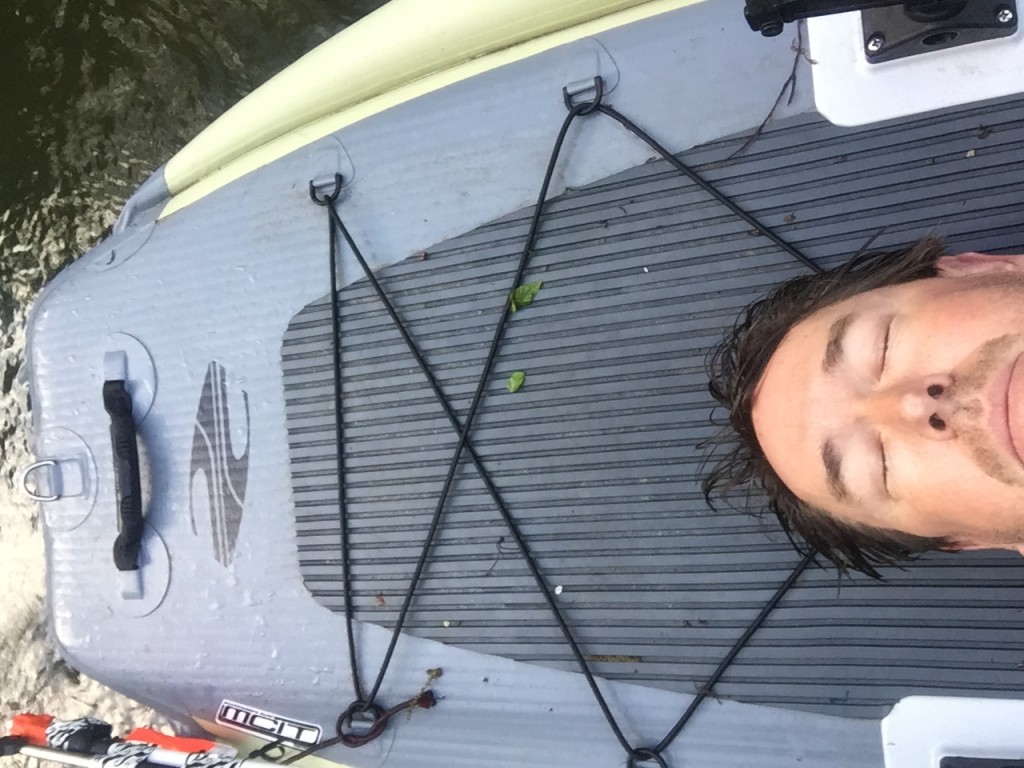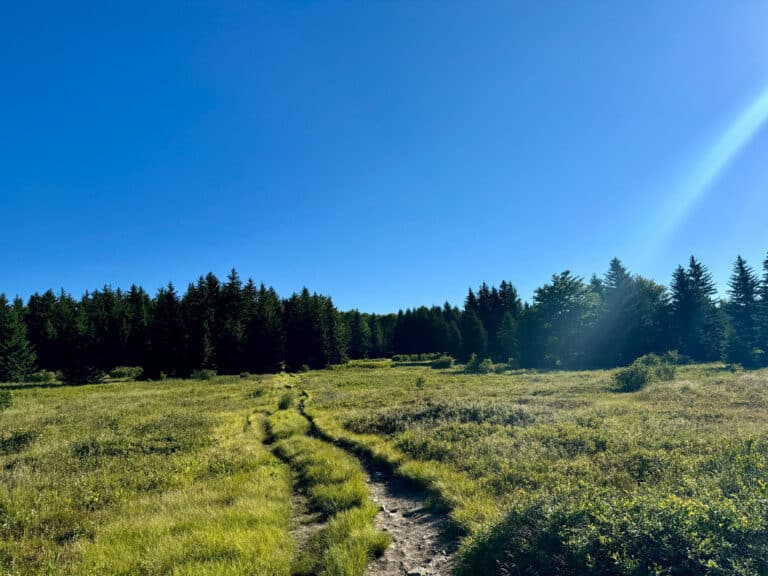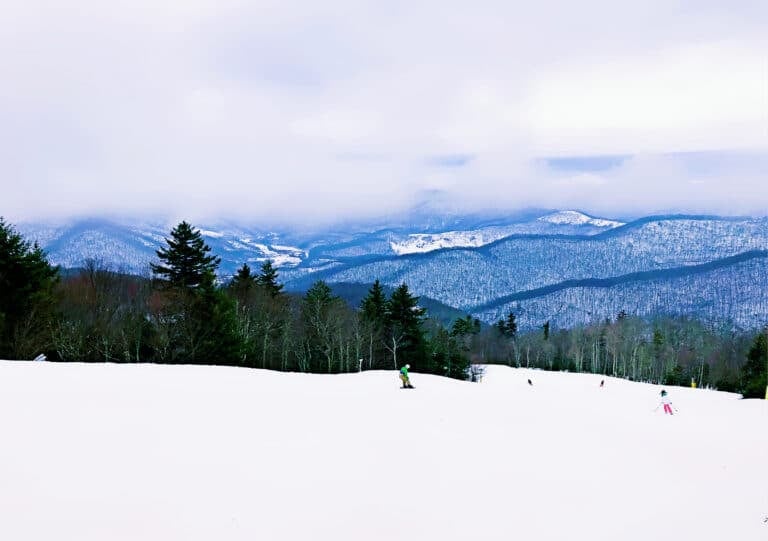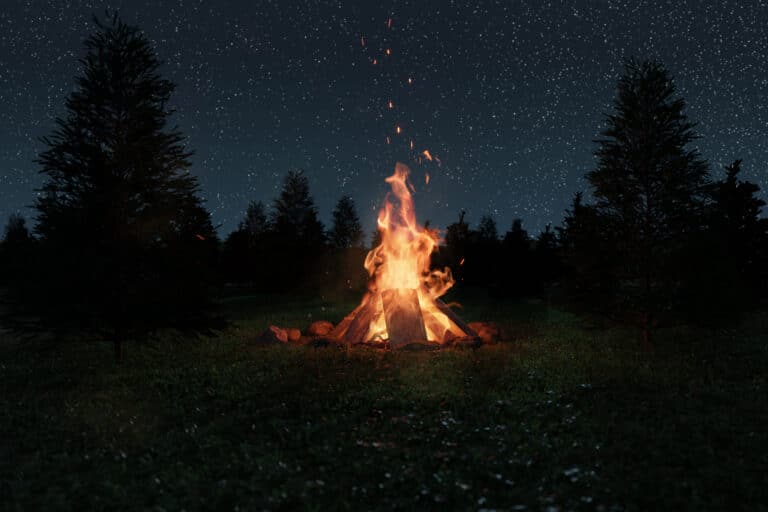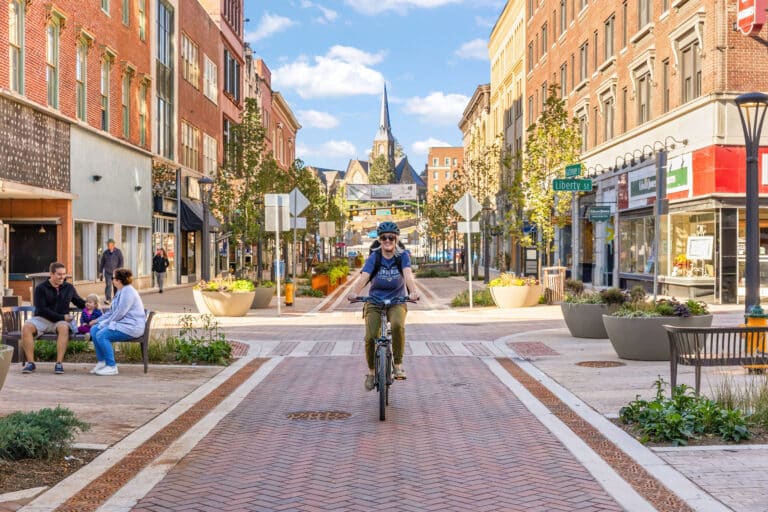Chris Lechner, a hand surgeon in Asheville, N.C., made national headlines in 2011 when he successfully reattached a 17-year-old girl’s hand after it was severed in a car accident. Last month, Lechner pulled off another incredible feat: he standup paddled the entire 227 miles of the French Broad River. Beginning at the French Broad headwaters near Rosman, he paddled, camped, portaged, stopped for beers, and filmed his two week journey, which ended 27 miles north of the Lake Douglas dam in downtown Knoxville, Tennessee.
Why did you do it?
I started kayaking at age 12, and my first whitewater river was the French Broad River. When you are 12 years old, a place like Asheville and the river that slices through it are not easily forgotten. I knew at age 12 this would be my home.
Wilma Dykeman, author of the classic The French Broad, was my next inspiration. Her love for the river was palpable. She made me think of the river as a grand character in a grand play. Marshall, N.C. became, for me the beating heart of this living waterway.
I purchased a stand up paddleboard two years ago. It was different than my kayak. It made me feel like a river explorer. I became more interested in observing the river than conquering its rapids. I paddle almost every day, during lunch breaks, or any quick sneak away paddle. My board is always on my car.
How did you train for it?
I paddleboard almost every day, usually upstream and against current. The harder, the better. Paddling downstream does not push me enough. Strength and endurance come from resistance. I also do yoga 2-5 days a week. I will be 55 in August. Stretching and core stability provide the platform from which to pull harder in swimming or paddle sports or run harder and longer. Three-part breathing is a simple tool that every athlete should understand. I also swim 1-2 times a week. This will increase now that I am training to swim 60 miles solo across Lake Michigan on August 8 to raise money for the expansion at Asheville Community Yoga.
What did you learn?
Having two weeks to myself, to float the river I love with no agenda other than finishing the 227 miles, was a real gift—a gift given by my wife and family and those I work with.
A perfect formula for learning lessons in life: lots of time alone + physical exertion + nature + potential dangers + interactions with unknown people = high likelihood of learning lessons.
A lesson is very different than an experience. It is easy to have a fun experience, like going to a fancy restaurant or taking a cruise. Maximum enjoyment with little personal cost. Lessons are quite different. They require something of you. They cost you something.
Paddling 8-12 hours a day standing on a paddleboard creates blisters on the hand that after a week or so become thick callouses. Lessons to me are like callouses worn into the hands. Stroke after stroke after stroke, eventually my hands adapted. I changed. Lessons are like this.
The lesson I learned is that all living things, especially people, need one thing to thrive and grow: respect. They can endure hunger, pain, disappointment, and loss but they cannot handle being ignored and treated dishonorably. I needed to learn this lesson. I was moving through my life at a rapid speed that was filled with fun and excitement, but I was overlooking my own wife, family, and dear friends. My selfishness hurt people.
The excitement and adventure you seek lies buried deep in the eyes of each person that you come across. Honor them. They don’t have to earn it. They are beautiful, just like the osprey and the sunset.
What was the most inspiring moment on your trip?
Nature inspired me constantly: rainbow trout glistening in the sunlight, kingfishers leading me downstream, osprey fishing with me, otters playing hide and seek, beavers smacking their tails territorially. Most inspiring were the people I met, including one named Catfish. Catfish has owned the Lake Douglas Dam Tail Water Bait and Tackle and convenience store for 54 years. Catfish is blind, but with a simple question I watched his eyes change from dull to sparkly. With a simple question I watched a man transform into a Master Storyteller. With a simple question I watched a man become a child. With a simple question I watched a blind man see. And what was the question? “Why do they call you Catfish?” I now have a friend named Catfish!
What was the scariest moment on your trip?
On the 15th and final day, I had a very big day of paddling to arrive at my pickup point in Knoxville by 6pm. I normally paddled 10-20 miles per day. This final day, I had 25 miles to paddle. My hands were sore and inflamed. A huge storm came in from the north blowing and raining and thundering so hard against me that I was actually being blown back to Asheville. I hunkered down and felt concern escalating into worry and fear. Right in the midst of my worry, a deer runs and leaps across the river just downstream totally distracting me from my concerns. The deer brought me back, centered me, and reminded me that I must paddle one stroke at a time and no amount of overthinking will make the wind and rain go away.
File Jun 10, 4 00 32 PM from Blue Ridge Outdoors on Vimeo.
Did you stand up on the paddleboard the whole trip even on the whitewater?
I stood up the entire trip. Occasionally I sat down to fish or do yoga. I am very familiar with the whitewater on section IX and have paddled it in a kayak for 40 years. This was my first time standing up. I only fell off one time. That was embarrassing because I had finished the rapid and got sloppy turning in to the eddy and simply fell off. I crouched down at the big drop in Frank Bells rapid but didn’t really need to. After so many hours on the board it became easier than you might imagine balancing while being tossed around by the waves. The key is to always have your paddle in the water providing support and bracing.
Chris Lechner SUPs the entire French Broad. from Blue Ridge Outdoors on Vimeo.
What is river magic?
I believe the Appalachian Trail is as close to a pilgrimage as we have in the United States. A pilgrimage is a spiritual journey. The pilgrim is seeking answers, struggling with big questions. Who am I? What do I believe or not believe? How shall I spend my allotted days? How do I want to be remembered? What and who matter most to me?
A pilgrim also has a destination. Pilgrims travel simply. They are stripped down to essentials. All pilgrims are the same. There is no first or second class on the Appalachian Trail—or the French Broad River.
People receive pilgrims just like they did in Chaucer’s day. They provide shelter, food, money, showers, transportation, encouragement and even protection. Magic. The same things many folks did for me on my French Broad River Pilgrimage.
Want to experience the magic? Pick a journey rather than a vacation. Dress simply, leave your titles behind, exert some energy and walk or ride or bike or swim or paddle. And finally: ask the big questions but look for the answers in the people you meet along the way.
